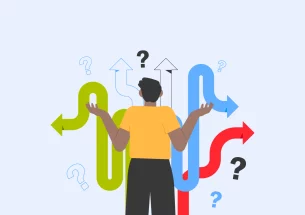The Toll of Trolls on Social Media Communicators
In a recent webinar with Santa Rosa County School District MPIO, Brandi Bates and CivicPlus® (formerly ArchiveSocial) we discussed the topic of how to handle social media trolls when working online and what they’ve learned from their experiences.
A Platform that Never Sleeps
Social media is an excellent resource for efficient communication and getting important messages out to your community. It’s also a great tool to show some personality behind your agency and highlight all the fantastic things you do. But with the good comes the ugly, and since the beginning of the web, online trolls have been the bane of rational, civil internet users.
Trolls enjoy denouncing a post or message and take pleasure in provoking individuals online. And with social media always on and accessible from just about anywhere, trolls are also always available. This can be especially troubling for government agencies who should prevent misinformation from being spread but can’t delete comments or don’t want to feed the trolls.
The 6 People You Meet Online
However, not everyone that disagrees with a message is considered a troll. In the webinar, Brandi Bates broke down the six basic personalities you come across on the internet.
- Supporters encourage their colleagues to follow and often like and share your posts
- Critics point out your perceived mistakes or typos. You should always respond and thank your critics
- Upset followers have a legitimate complaint that you may be able to turn around, so address them quickly
- Complainers are annoying but ultimately harmless
- Haters hate your organization, and possibly hate you
- Trolls are off topic, attacking, and offensive
Why do Trolls Troll?
There are several reasons why trolls may choose to inflict harm. The first reason is that they think they are funny or clever. Another is that they could be bored or even drinking. Trolls enjoy confusing and baiting followers. This behavior stems from the online disinhibition effect. This is the lack of restraint that trolls have communicaing online vs. in person. Research shows that trolls are Sadists.
Here are some easy ways to spot social media trolls
- They try to make you angry
- They act entitled
- They exaggerate. A lot.
- They make it personal
- They often can’t spell
- They YELL
How to Handle Trolls on Social Media
Even when you have the best intentions with your messaging, sometimes it can attract an unexpected audience. That’s right, trolls. Taking down a troll will be different for each agency, as there are no hard and fast rules. In general, Brandi suggested treating communication on your social platforms like you would a news conference and keeping in mind that you’re there to provide the facts. “Don’t react emotionally, stay on topic, and steer any off-topic or negative comments offline,” said Bates.
If you don’t have the resources for moderators, there are tools provided by the platforms that you can leverage. For example, Facebook and YouTube have comment moderation tools for your page, and Facebook allows you to block words and set profanity filters. Facebook, Twitter, and Instagram also have options to report posts and abusive behavior. Bates encouraged listeners to “reconsider Facebook’s badges for ‘top fans’ if your top fans are all trolls. Trolls love that.”
Why Not Let the Haters Hate?
One in four public record requests specifically reference social media content, and that number is only growing. Social media is considered a limited public forum, one that governs the acceptable use of comment moderation. That means that social media is a public record (in all 50 states), and you’re held to it, not the platform. To protect your public and agency, you’ll want to:
- Establish a social media policy for “no trolling” for your platform that outlines the consequences of abusive or off-topic comments
- Create or follow a comment moderation guide that allows moderation of inappropriate and irrelevant content while still respecting relevant opinions and First Amendment concerns
- Archive social media, as no policy or guide is foolproof. With CivicPlus’ Social Media Archiving software, this will also allow you to archive any comments that may be deleted
What Content you Can Moderate
Trolls may seem like an uncontrollable thing to handle when working with online platforms, but there are a few things you have to consider. Sometimes, you don’t have to respond to social media trolls to moderate them. It is crucial to know what you have control over. Here is a list of things given to us by Bates that you can take control over:
- Direct threats
- I.P. or copyrights
- Inciting illegal acts
- Defamation
- Commercial solicitation/advertisements
- Malware/phishing
- Personally identifiable information
- Cyberbullying
- Off-topic/spam
What about blocking someone from your page?
Remember that blocking a critic is the essence of “viewpoint discrimination”. Before you block a user, Bates encouraged listeners to always ask themselves these two questions: “Are they protected under the First Amendment?”, and “Are they violating terms of use or policy?”. Lastly, you should already have your legal team’s support, and if you’re not sure, just ignore them.
Why not just turn off comments?
“The point of social media is engagement,” explained Bates. “Once you stop engaging, you’re not going to show up.” Bowman agreed that at best this is a temporary measure, but never a long-term strategy.
Lessons Learned
Throughout her research Bates has found that people tend to seek and accept information that supports their beliefs and disregard facts that contradict them. She encourages agencies and districts to focus on your overall message and the positive you’re doing, rather than trying to figure out every negative comment.
As for how to handle trolls on social media in times of disasters, Bates shared some of her biggest lessons learned from dealing with trolls first-hand during times of crisis:
- Don’t use the words “today” “tomorrow” or “Yesterday”
- Be fast, be brief, be direct, be accurate, but be careful
- Remember “preliminary” and “from what we know as of now”
- Update posts throughout the day and mark old posts as outdated
- Consider turning off commenting on outdated posts
Bates also offered advice for when your page is circling the drain. The best thing to do is lock it down. “Take a break and put your page on snooze for a while,” said Bates. She reminded listeners to not be an easy target and think of what can go wrong before you make any post. Most importantly, “don’t wrestle the pig, you both get dirty,” concluded Bates.
3 steps toward compliance
Social media trolls hurt the morale of your entire organization, not just you or your team. They spread dangerous misinformation to your followers, set a negative tone for your page, and can tarnish your reputation if unmitigated. Here are three steps you can take toward managing and dealing with trolls:
- Establish a social media policy: A solid social media policy can help protect your agency & your sanity. Due to the evolving case law it is important to review this annually or as needed. Don’t author one in a silo; use your agency’s legal resources.
- Create a comment moderation guide: A sound commenting policy is all about balance. It should allow moderation of inappropriate and irrelevant content while still respecting relevant opinions, and First Amendment concerns. Train all staff members.
- Capture, monitor, and retain your social media: Social media is open 24/7, and no policy or moderator is foolproof, so protect your agency by archiving records of every post and comment, especially those you plan on deleting and monitoring for critical terms and phrases for a quick resolution.
If you’re looking for more resources against trolls, we have you covered:


